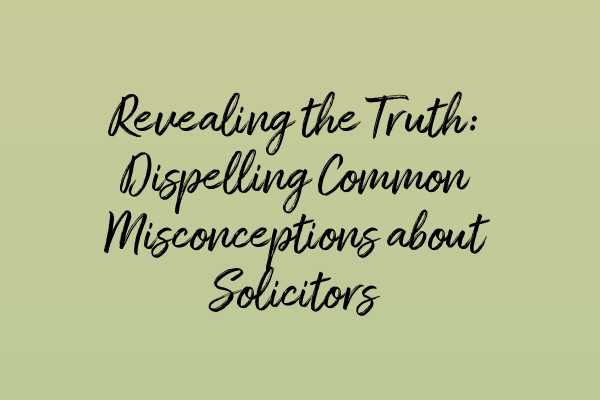Revealing the Truth: Dispelling Common Misconceptions about Solicitors
When it comes to the legal profession, there are often myths and misconceptions that surround the role of solicitors. These misconceptions can sometimes deter individuals from seeking the help and guidance they need. In this article, we aim to dispel some of the most common misconceptions and shed light on the truth about solicitors.
Myth #1: Solicitors are only involved in criminal cases
Contrary to popular belief, solicitors are not exclusively involved in criminal cases. While some solicitors do specialize in criminal law, there are also solicitors who specialize in various other areas such as family law, immigration law, corporate law, and more. Solicitors play a crucial role in providing legal advice and representation in a wide range of legal matters.
If you are interested in learning more about the intricacies of private prosecutions in criminal cases, you can read our article on Private Prosecutions: Exploring Non-Governmental Prosecutions in Criminal Cases.
Myth #2: Solicitors are expensive and only serve the wealthy
It is a common misconception that solicitors are expensive and only cater to the wealthy. While it is true that legal services can be costly, there are options available to suit various budgets. Many solicitors offer different fee structures, such as fixed fees or payment plans, to ensure accessibility to their services.
It is important to remember that solicitors have a duty to provide quality legal advice and representation to all individuals, regardless of their financial situation. Legal aid is also available in certain cases to provide assistance to those who cannot afford private representation.
Myth #3: Solicitors are ruthless and only care about winning
Another common misconception about solicitors is that they are solely focused on winning cases and disregard the well-being of their clients. This is far from the truth. Solicitors have a professional obligation to act in the best interests of their clients and to provide ethical and honest advice.
Solicitors understand the emotional and personal nature of legal issues and strive to provide support and guidance throughout the entire legal process. They are dedicated to achieving the best possible outcome for their clients while upholding the principles of justice and fairness.
If you are interested in learning more about the rights of the accused and the importance of protecting individual liberties in criminal proceedings, you can read our article on Rights of the Accused: Protecting Individual Liberties in Criminal Proceedings.
Myth #4: Solicitors and barristers are the same
There is often confusion between the roles of solicitors and barristers. While both are legal professionals, they serve different functions within the legal system.
Solicitors are the primary point of contact for clients and provide legal advice, draft legal documents, negotiate settlements, and represent clients in lower courts. Barristers, on the other hand, specialize in courtroom advocacy and are typically instructed by solicitors to provide expert advice and representation in higher courts.
It is important to recognize the unique roles and expertise that solicitors and barristers bring to the table, as they work together to ensure the best possible outcome for their clients.
Myth #5: Solicitors are only needed for complex legal issues
Solicitors are not just necessary for complex legal issues. In fact, seeking legal advice at the early stages of any legal matter can often prevent complications and help individuals make informed decisions. Whether it is a personal injury claim, buying a property, drafting a will, or resolving a dispute, solicitors can provide valuable guidance and support.
If you are interested in learning more about the differences between magistrates’ court and crown court and the implications for your case, you can read our article on Magistrates’ Court vs Crown Court: Understanding Key Differences.
Myth #6: Solicitors only work in traditional law firms
The legal profession is evolving, and solicitors can now be found in a variety of settings. While many solicitors still work in traditional law firms, there are also solicitors working in-house for corporations, government agencies, and non-profit organizations. Additionally, there has been a rise in freelance and virtual solicitors, who provide their services remotely.
Solicitors are adapting to the changing landscape of the legal profession to ensure that they can cater to the diverse needs of their clients.
Myth #7: Solicitors are not concerned with the well-being of vulnerable witnesses
Protecting the rights and well-being of vulnerable witnesses is of utmost importance to solicitors. They have a duty to ensure that vulnerable individuals are provided with appropriate support, accommodations, and safeguards when involved in legal proceedings.
If you are interested in learning more about best practices and legal safeguards for protecting vulnerable witnesses in criminal trials, you can read our article on Protecting Vulnerable Witnesses in Criminal Trials: Best Practices and Legal Safeguards.
Myth #8: Understanding legal jargon is crucial before consulting a solicitor
Many individuals hesitate to consult a solicitor because they believe they need to have a thorough understanding of legal jargon. However, it is not necessary to be well-versed in legal terminology before seeking legal advice. Solicitors are skilled at explaining complex legal concepts in plain language, ensuring that their clients understand their rights and options.
If you are facing legal issues and are unsure about the complexity of UK bail laws, you can read our article on Unraveling the Complexities of UK Bail Laws.
Conclusion
Solicitors play a vital role in the legal system, providing expert legal advice, representation, and support to individuals across a wide range of legal matters. By dispelling these common misconceptions, we hope to encourage individuals to seek the guidance they need when faced with legal issues.


Leave a Reply